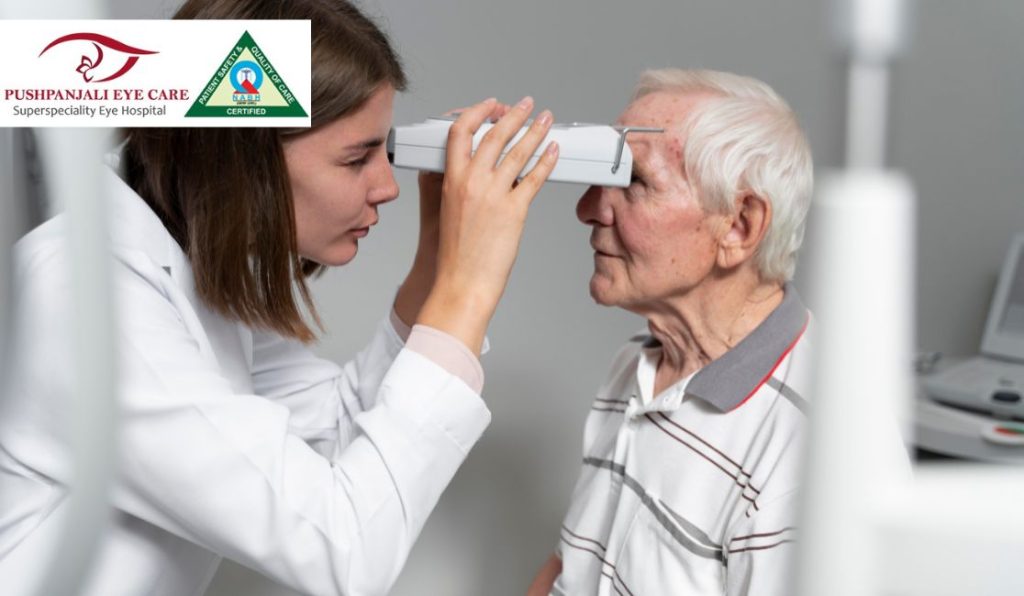-
Pushpanjali Eye Care Hospital, Golpark, Kolkata-700029
Pushpanjali Eye Care Hospital, Golpark, Kolkata-700029

By PushpanjaliEyeCare
05.07.2025
Eye issues are an inevitable part of getting older. At the same time, some visions are nothing more than mere annoyances. But others can lead to permanent vision loss and even blindness. The best way to protect your eyes in your later years is to be well aware of the signs of age-related vision care. In that case, laser eye surgery in Kolkata may be beneficial for various types of eye surgical issues. Our eyes are affected by the natural progression of life. Specific eye problems can only happen with age. Early detection and regular eye exams are crucial to maintaining your vision. This blog will explore the warning signs of age-related eye problems and guide how to prevent them.
Typical signs include difficulty reading small print, needing brighter light, or trouble seeing at night. It may indicate age-related eye conditions, including glaucoma, cataracts, or macular degeneration. Other warning signs include frequent headaches, blurred vision, dry eyes, or seeing floaters. Here are the most common warning signs of aging eyes:
Floaters are standard with the age. Changes in the vitreous usually cause them. This is a gel-like fluid that fills the back of the eye. Generally, floaters are nothing of great concern. However, if you notice a sudden change in the type of floaters, don’t get panicked. It is essential to see the best eye specialist in kolkata immediately. These symptoms could be a sign of a more serious condition, such as a detached retina.
People aged 40 and over are more likely to experience reduced tear production. This increases the risk of dry eye. This condition is commonly diagnosed in individuals over the age of 65. A dry eye can cause a stinging or burning sensation. It may also cause a gritty feeling when opening and closing eyes. It can also cause excessively watery eyes. The dryness prompts the eye gland to produce more tears.
A dry eye is often treated with artificial tears or eye drops. If you experience more severe symptoms, it is advisable to consult with the best eye clinic near me for optimal treatment.
Glaucoma is one of the leading causes of blindness over the age of 60. Glaucoma is usually caused by improper fluid drainage. It leads to a buildup of pressure behind the eye. If left untreated, this pressure can damage the optic nerve.
Glaucoma is a generally pain-free condition. It usually affects both eyes. The high amount of pressure behind the eye can lead to vision loss as well as total blindness.
As we get older, the proteins located in the lens break down. It can lead to the formation of cataracts. Cataracts cause blurred or cloudy vision. 53% of Indians are diagnosed with cataracts by the age of 80. Diabetic patients are at a higher risk of cataracts. Laser eye surgery in Kolkata will be a savior for cataract patients.
Macular degeneration is another leading cause of vision loss. In fact, the condition affects over 10 million Americans each year. This disease damages the macula, which is located in the center of the retina. The retina is responsible for both color vision and straight-ahead vision. As the disease progresses, it can cause wavy or blurred vision. If left untreated, people will eventually experience a loss of central vision.
While there isn’t a known cure for macular degeneration, there are ways to slow the disease’s progression, including making healthy lifestyle choices such as not smoking and eating a healthy diet.
A detached retina occurs when the retina separates from the supporting elements at the back of the eye. Aging causes the gel-like fluid in the center of the eye, known as vitreous, to change in size and texture. This increases the risk of the retina becoming detached.
The longer the retina remains detached, the greater the risk of permanent vision loss. Common symptoms of retinal detachment include:
Diabetic retinopathy is a condition that affects those diagnosed with type 1 and type 2 diabetes. It occurs when excess glucose damages the blood vessels located in the retina. When injured, blood vessels can swell and leak blood, along with other fluids, into the retina. This causes cloudy vision, along with blurriness and floaters.
If left untreated, the symptoms of diabetic retinopathy worsen. You may experience empty areas in your vision as well as dark spots. Some report vision loss as well.
Getting older doesn’t mean that you have to accept vision problems. One of the best ways to protect your eyes is with regular eye exams. An ophthalmologist can detect any underlying eye disease. Contact Pushpanjali Eye Care for improved eyesight and management of age-related eye diseases.